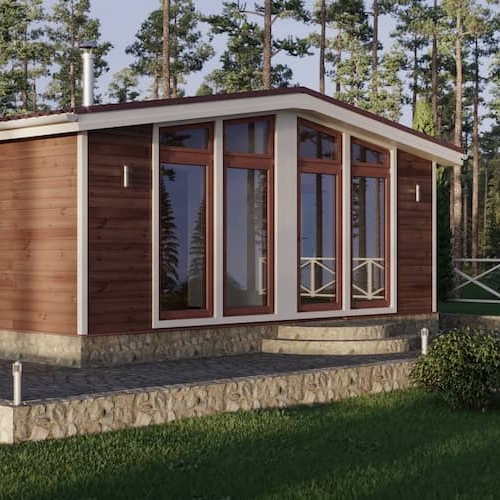What is a chattel mortgage and how does it work?
Jan 31, 2024
•3-minute read
Purchasing a manufactured home or other similar piece of movable property can be confusing. Since the structure is often separate from the land it rests on, the rules for purchase can be a bit different from buying a traditional home.
A chattel mortgage is one way of financing a mobile piece of property – but what is a chattel mortgage and how exactly does it work? Let’s walk through our guide to chattel mortgages so you can determine whether this option might be a good fit for you.
Rocket Mortgage® does not currently offer chattel mortgage loans.
Chattel mortgage definition
A chattel mortgage is a loan for a manufactured home or other movable piece of personal property, such as machinery or a vehicle. The movable property, called “chattel,” also acts as collateral for the loan.
Basically, this means that if you default on your chattel mortgage, your creditor or lender can take possession of the property being financed and sell it to pay off the loan. If you’re struggling financially, this could mean losing your home. Your lender doesn’t own your property forever, however – if you pay off your chattel mortgage, the property belongs to you.
Chattel mortgages aren’t for everyone. If you want to explore buying non-movable property, a FHA loan can be a great choice with its lower down payment requirements. You can also use a conventional loan to purchase a modular home, which isn’t the case with manufactured homes. Talk with a loan expert about your home-buying options.
Chattel vs. traditional mortgages
The main difference between chattel and traditional, or conventional, mortgages is that you can only use chattel mortgages for movable property. Conventional mortgages, on the other hand, are typically reserved for stationary homes. Also, chattel mortgages usually only finance the movable property itself and not the land where it sits. This is unlike traditional mortgages, which typically include both a home and the space it rests on.
Borrowers with mobile personal property usually must own, rent or buy land to keep their home or vehicle, but some exceptions exist. Depending on where you live and what type of property you’re financing, some lenders may include land rental costs in your loan payment.
Chattel loans have shorter repayment periods, lower processing fees and lower maximum loan amounts than their conventional counterparts. They also tend to have higher APR and interest rates. This means monthly payments may be high, but you’ll also pay off your loan faster.
What chattel loans are used for
Chattel mortgages work for various types of movable personal property, including:
- Manufactured homes: Manufactured homes, formerly known as “mobile homes,” are a type of property often financed with chattel mortgages. These movable homes are built offsite and relocated using a chassis. Movable homes of this kind built before June 15, 1976 are referred to as “mobile homes,” while homes built after that date are called “manufactured homes” due to a change in standards set at that time by the U.S. Department of Housing and Urban Development (HUD). Rocket Mortgage does offer traditional conventional financing for manufactured homes that are permanently attached to the land as real property and sitting on a permanent foundation. They must be manufactured after June 15, 1976.
- Modular homes: Modular homes are similar to manufactured homes in appearance but are less “mobile” and typically go on a more permanent foundation. Since they’re usually not moved after being placed, these homes can also be financed with conventional mortgages because they could be considered fixed. Modular homes must adhere to the same local building codes as traditional housing.
- Vehicles: A chattel loan can serve to secure a loan for a car or other vehicle, typically for business purposes. This option is a more popular choice in countries with a national goods and services tax (GST) because the loan allows the vehicle’s owner to claim GST associated costs and vehicle depreciation on their taxes.
- Equipment: Chattel loans can underwrite purchases of heavy equipment such as tractors, forklifts and other similar machinery. This type of loan especially makes a lot of sense for farm equipment, which you can acquire and put to use right away to make money that you’ll use to pay the loan off.
Whether you’re buying movable property as real estate or for other purposes, financing options with varying interest rates and down payment requirements are available.
Chattel mortgage lenders and your personal property
As noted, the property you’re financing belongs to your lender until you pay off a chattel mortgage. This doesn’t mean the property has a permanent lien on it, though. Once you’ve paid your loan in full, the property belongs to you, and your lender can’t take it or resell it.
If you fall behind on payments, however, remember that your property is also collateral for the loan. If you default on the mortgage, your lender will seize and repossess your property.
Tax implications of a chattel mortgage
The interest paid on a chattel mortgage is tax-deductible, just like interest paid on a conventional mortgage, though that’s only deductible up to a certain amount.
If you’re financing a manufactured or modular home fixed to the ground, you may also be able to take advantage of property tax deductions.
The bottom line
Chattel mortgages are a little-known but potentially good option if you’re looking to finance a manufactured home or heavy equipment. These loans are smaller than conventional loans and tend to have higher rates, but they have shorter terms and quicker payoffs.
If you’re interested in a traditional loan or refinancing, apply online today with Rocket Mortgage to see what rates you qualify for.

Sidney Richardson
Sidney Richardson is a professional writer for Rocket Companies in Detroit, Michigan who specializes in real estate, homeownership and personal finance content. She holds a bachelor's degree in journalism with a minor in advertising from Oakland University.
Related resources

6-minute read
Modular vs. manufactured homes: What's the difference?
Modular and manufactured homes are both factory-built, but they have some key differences. Uncover the distinctions between modular and manufactured homes.
Read more
5-minute read
Down payment assistance programs and grants: What they are and how they work
Need help buying a home? Explore the different types of down payment assistance programs and grants available to you today.
Read more

6-minute read
How much does a tiny home cost?
The tiny house movement is growing in popularity, but how much does a tiny home cost? Learn about the factors that impact pricing in this complete guide.
Read more